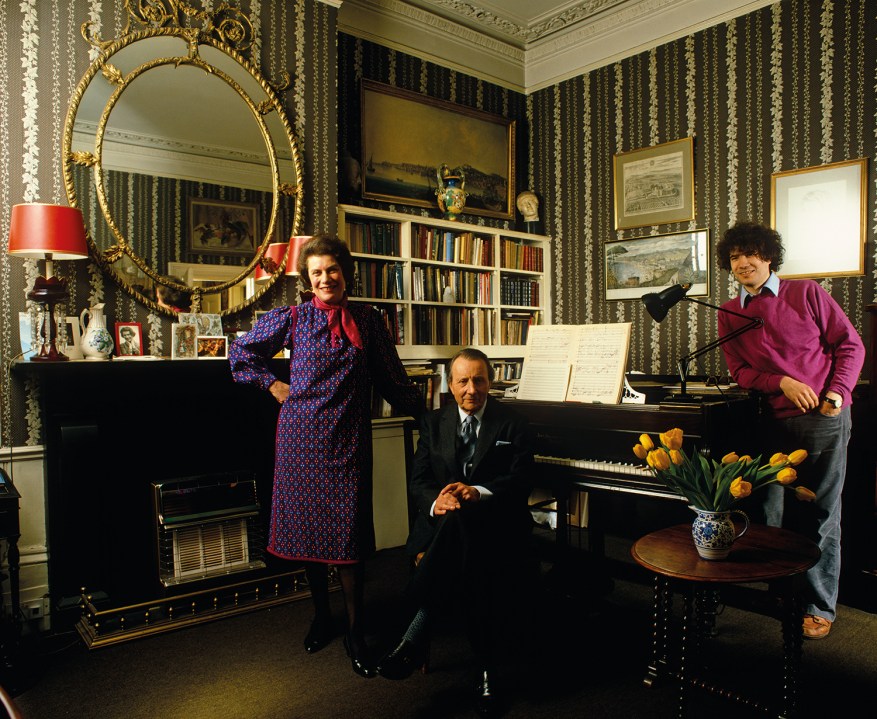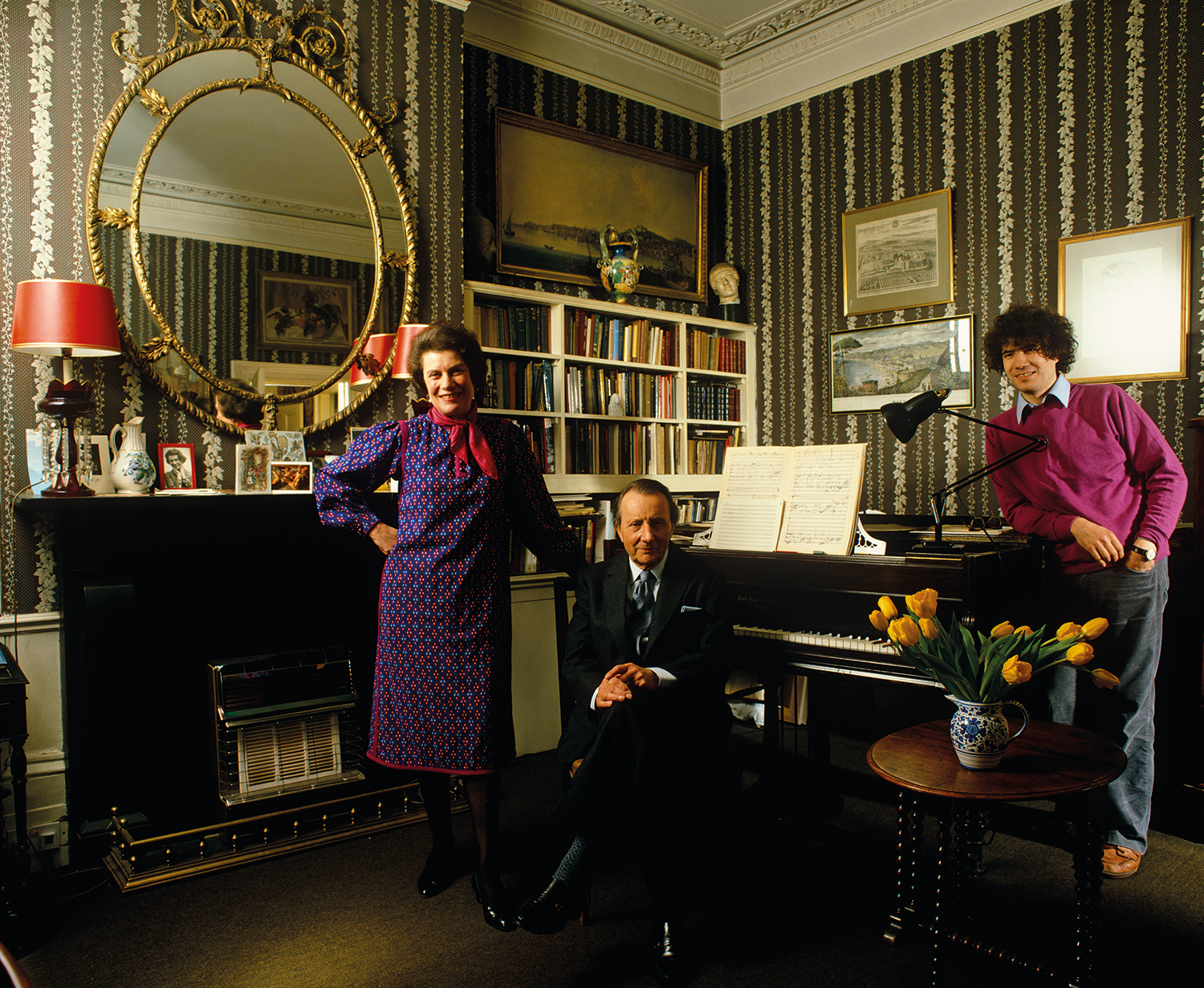
A few years ago I had a panic-stricken phone call from a female friend. ‘Help!’ she wailed. ‘Remind me what classical music I like. I think I’m going to be a guest on Private Passions.’
I could understand her anxiety. The programme, which celebrated its 30th birthday this month, is BBC Radio 3’s lofty version of Desert Island Discs. Eminent writers, scientists, artists and businessmen, plus the occasional book-plugging celeb, explain how music – mostly but not exclusively classical – is, well, one of their private passions. Even if, as in the case of my friend, it isn’t.
It’s an honour to be asked on the show, which is presented by Michael Berkeley – the first classical composer since Benjamin Britten to be elevated to the House of Lords. In other words, if you’re bluffing about your lifelong love affair with Mahler’s Lieder eines fahrenden Gesellen, then Lord Berkeley of Knighton will rumble you instantly, though he’ll be far too polite to let on.
In the end my friend chickened out. I didn’t blame her, though I’d love to have heard her enthusing about Schubert’s Piano Sonata D960 or Haydn’s Te Deum – both chosen by me.
It’s amazing how many otherwise cultivated people just don’t get classical music. They rhapsodise about Manet or Mann but fall silent if they’re asked about a new cycle of Bruckner symphonies. Yet, unlike my friend, I suspect few of them would turn down Private Passions.
Even the King has been a guest. In 2018 he chose Haydn’s C major Cello Concerto, the Quintet from Die Meistersinger, a chorus from Jean-Marie Leclair’s Scylla et Glaucus and Leonard Cohen’s ‘Take This Waltz’.
One of the joys of Private Passions is time-travelling back to an era before Radio 3 employed gushing disc jockeys. Berkeley is the last remaining voice from the station’s heyday. In 1974 he joined a team including Cormac Rigby, Tony Scotland, Patricia Hughes and Tom Crowe – magnificent presenters about whom the BBC deliberately told us nothing.
Young Berkeley was a bit of an exception, because he was the son of the composer Sir Lennox Berkeley and already winning plaudits for his music. He had Marc Bolan hair and played keyboard in a rock band called Seeds of Discord; he has admitted to a ‘druggy spell’. Yet on Radio 3 he spoke in the same graceful, self-effacing manner as his older colleagues – and he still does.
The first guest on Private Passions was Elvis Costello – a culture shock for Radio 3 stalwarts, but not the one they were anticipating. Costello chose an obscure single-movement Schubert sonata, followed by an aria from La clemenza di Tito, an extract from Stravinsky’s Soldier’s Tale, a Purcell fantasia and Alfred Deller singing Byrd. The only hint of crossover was Jeff Buckley performing a carol by Benjamin Britten. ‘His extraordinarily pure falsetto voice created quite a stir,’ recalls Berkeley.
Private Passions has always prided itself on its cocktail of guests. In the 1990s they included Edward Said, Jilly Cooper, John Peel, the Duke of Kent and Dame Edna Everage, who described Percy Grainger’s Pubic Hair Museum (not a figment of Barry Humphries’s imagination, but one of the composer’s very private passions). Recently we’ve had Lord Sumption, Bryan Ferry, Rupert Everett, Zandra Rhodes and the Revd Jonathan Aitken.
The programme arrived just in time to catch three giants of the 20th century: Sirs Ernst Gombrich, Georg Solti and Isaiah Berlin. Berkeley’s eyes light up at the memory of Berlin: ‘Here was this man who was telling me about seeing the White Guard in the Russian Revolution from the balcony in St Petersburg. But he was also wicked about Britten and Stravinsky and what they said about each other.’
Michael Berkeley is the last remaining voice from Radio 3’s heyday
I can well believe it; it’s hard to think of two more waspish composers. Britten was Berkeley’s doting godfather – ‘every Christmas or birthday there’d be a card with a £5 note in it’. But his ghosting of former friends was legendary, wasn’t it? ‘Oh, he was awful. People who displeased him were out, you know.’
Did Ben get on with Lennox? (If I’d done my homework I wouldn’t have asked – I didn’t know the two men had been lovers.)
‘Oh yes… the great thing was that they’d had an intimate relationship before he went to America with Peter Pears. And Ben was a little unpleasant over one or two things. But he was thrilled when Lennox asked if I’d be his godson and from then on they were really very good friends. Ben commissioned and conducted Lennox’s Stabat Mater, which is a very beautiful piece.’
Indeed it is: tight-knit polyphony illuminated by exquisitely balanced woodwind and brass. Berkeley’s music drifts further from tonality but he shares his father’s love of diaphanous textures and his sense of proportion. He’s rare among modern composers in that he knows when to stop – unlike, for example, John Adams, whose cosmic imagination rarely embraces the principle that less is more.
Berkeley chuckles at this. ‘I remember asking Simon Rattle why he was doing a particular piece, and he said, “Well, I’m a sucker for anything that makes the orchestra sound like a million dollars.” He meant in terms of texture, that sort of glistening. Which John Adams is very good at, you know.’
Is there music that makes him groan when a guest picks it? ‘People often say to me, I know when you don’t like something or when it’s not really to your taste.’ So what doesn’t he like? ‘A certain sort of repetitive music. I was brought up by Lennox in the wake of his teacher Nadia Boulanger, so I look for organic development. But I like some minimalist music. The early Steve Reich, for example. But there’s music which seems a bit mindless, though I really can’t say any composer’s names, as a fellow composer.’ (But note that back-handed compliment to Adams.)
A paradox of Private Passions is that the establishment types you expect to be boring are often the most diverting guests. Back in January the economist Sir Paul Collier spoke so engagingly about the ‘cleansing purity’ of Gregorian chant and the magical melancholy of 17th-century viols that if he gives up the day job Radio 3 should sign him up as a presenter.
‘Those are the programmes I really relate to,’ says Berkeley. ‘But you can’t always find that kind of person. When we do, I’m thrilled. But Radio 3 also feels the need to have a smattering of people who will attract previews, reviews and that sort of thing – and that allows one to have things that are more intellectually challenging.’ So the choice of guests isn’t entirely up to him? ‘Certainly not.’ Does he have a veto? ‘I think if I were to say to the editor, I really can’t do this person, they would listen – but I’ve never had to do it.’ Has any episode been scrapped because the guest wasn’t up to it? ‘The only one we’ve ever dropped was somebody who just got paralysed in front of the microphone. It’s a pity, because it was an interesting person.’
In the Guide to 20th Century Composers, published in 1996, Mark Morris described Berkeley’s music as coloured by ‘a furious anger, almost palpably aimed at injustice, and a kind of personal frustration at not being able to do more’. Berkeley doesn’t seem so frustrated now, perhaps because he’s such an effective crossbencher in the Lords. In 2018, for example, he steered through an amendment to the Children Act enabling the Family Court to issue an Order protecting girls from genital mutilation.
Yet there are inevitably times when he finds himself banging his head against a brick wall. Last year he voiced his dismay at Pope Francis’s brutal restrictions on the celebration of the traditional Latin Mass. ‘I found it very disillusioning. As a chorister at Westminster Cathedral, I loved the ritual of the Latin. It was as if it was just being chucked out of the window.’
‘Oh, Britten was awful. People who displeased him were out, you know’
He’s also horrified by successive British governments’ philistine approach to musical education, which ignores the capacity of young people to develop formidable musical skills at an early age, ‘like Swiss and French alpine children who learn to ski almost before they can walk. And don’t forget the cutting of money to the BBC, the way Radio 3 has had to cut things in order to keep going.’
No doubt, but you can’t blame politicians for the atrocities introduced by the current controller, Sam Jackson, such as the spin-off station Radio 3 Unwind. Audiences are invited to ‘sail away on the tides of sleep’ as they listen to new-age drivel combined with the Radio 4 shipping forecast. What does Lord Berkeley make of that?
‘Well, look, I’ve been broadcasting since the early 1970s and I’ve seen controllers come and go. And we still have the core central product, the commissioning of new music, the Proms and programmes like Composer of the Week.
‘Now I’ll tell you something. Thirty years ago, an eminent BBC person, I won’t say his name, but somebody absolutely at the top of the pile, said “Michael, I don’t think Radio 3 will exist in 20 years”. I was very shocked, because this was somebody who might know that kind of thing. Well, it has existed… There are aspects of it.’
Whether those aspects add up to a classical radio station is a matter of opinion, but it seems unfair to press the point. What’s undeniable is that Private Passions, whose charming and insatiably curious presenter happens to be one of Britain’s finest composers, proves that Radio 3 can still reach the standards of its golden age – the brightest jewel in a tragically battered crown.









Comments